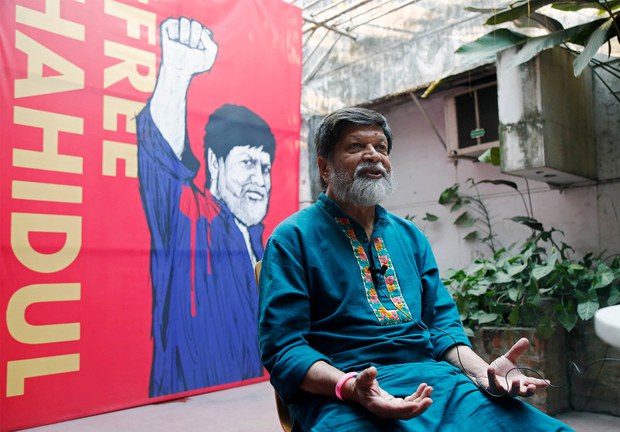Bangladesh: Shahidul Alam Speaks Out After 107 Days in Jail
2018.12.10
Dhaka
 Bangladeshi Photographer Shahidul Alam talks to BenarNews journalists in Dhaka, Dec. 9, 2018.
Bangladeshi Photographer Shahidul Alam talks to BenarNews journalists in Dhaka, Dec. 9, 2018.
Freed from jail after more than 100 days in custody without charge, prominent Bangladeshi photojournalist Shahidul Alam spoke out during an interview with BenarNews against government efforts to silence him and other free-minded people.
The government made a calculation that misfired by moving to arrest him on Aug. 5 on suspicion of violating Bangladesh’s defamation laws, Alam told BenarNews. The wide-ranging interview is among the first he has given following his release on bail Nov. 20 after a half dozen attempts by his legal team to secure bail.
“I think it was a message being given,” he said about his arrest. “There was a certain calculation … and I suspect it was a message and a signal to others who might dare to speak, that this is the position that they take.”
Alam said the government was not prepared for the international reaction to his arrest.
“They clearly miscalculated, not only what I did, but also what everyone else did, particularly the people outside the jail, the huge resistance that came out, the fact that people were as defiant as they were, despite the fear, despite the intimidation,” he said.
Alam said he was dragged from his home on Aug. 5 by five or six people over comments he made in YouTube postings and an interview with the Al Jazeera television network.
In Sunday’s interview, he did not back down from the TV interview that drew the government’s attention in the first place.
“Everything I said on the Al Jazeera interview is something I stand by and something that pretty much everyone else, including the government, really knows.
“In terms of what bothered them the most, it’s difficult to say, but it’s quite possible that questioning their legitimacy at this particular time would be of concern to them,” he said.
Alam was arrested after giving the interview to the Al Jazeera TV network about street protests in Dhaka that followed the deaths of two students who were run over by a bus. Prosecutors alleged that, in the interview with the TV network, he had labeled Prime Minister Sheikh Hasina’s government as “unelected.”
Recounting his arrest in August, Alam said he was alone at his home when a young woman rang the doorbell and addressed him as Uncle Shahidul. He opened the door and a group rushed in and forcibly dragged him out.
“I knew I was alone in the house, I wanted to alert other people, so I started shouting out so people could hear me,” he said, adding, “I tried to slow everything up as much as I could.”
As Alam resisted by sticking his legs out as the group shoved him into a van, his captors talked about slamming the door on his legs. They also tried to quiet him.
“They tried to gag me to stop me from shouting, so I bit the hand that was trying to gag me. They handcuffed me behind my back, they blindfolded me and they drove away,” he said.
Life behind bars
Alam described prison conditions as horrendous.
“I noticed there were no pillows, no sheets, one toilet for them to share. The prisoners were using their sandals as pillows,” he said.
The photojournalist praised his fellow prisoners and his wardens for looking out for him while he was locked up. At the beginning he shared a cell with a convicted murderer – just the two of them – while as many as 170 prisoners, according to Alam’s head count, were housed in an amdani or large intake room.
“The people within the jail were very respectful toward me, particularly the prisoners. They brought me bananas, they brought me fruit juice, they brought me milk,” he said.
“I was very lucky because I was recognized, and I believe I got a huge amount of support from people at all levels of the jail, particularly with fellow prisoners. They looked after me, they made sure that nothing untoward was happening to me, and I think the jailers and the wardens themselves recognized who they were dealing with.”
His experience in jail gave taught him a lot about Bangladesh’s prison system, Alam added.
“I now know what jail is like. I now know how many innocent people are in jail, who should not be there in the first place,” he told Benar. “[S]o jail reform is something that I very much want to work on.”
As for the future, Alam said he would not change his attitude.
“I spoke the truth then, I speak the truth now. They had no right to arrest me then and they don’t have any right to arrest me now,” he told BenarNews. “I will continue to speak as a free man.”







